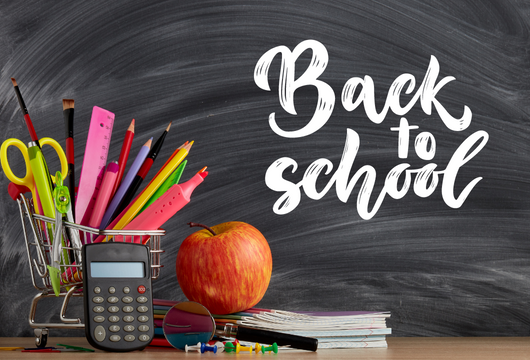
The start of a new school year can be experienced in a variety of ways by children and their families. While many children may be excited to reconnect with friends and meet their new teachers in a few weeks, others may feel disappointed, anxious, and stressed by the thought of their first “regular” summer in years coming to an end.
Families should be eased into this transitional time – check out our tips on how to best prepare yourself and your children for the exciting and emotional return to school!
Tip #1 Highlight the Good
Children’s anxiety about the new school year often overshadows positive memories from years past. General statements of encouragement like “It will be great!”, may not be effective. Instead, try asking your child to identify specific things they enjoyed about school in years prior. Helping your child recall positive aspects of school such as friends they missed over the summer, favorite subjects, or activities they enjoy can help decrease stress and negative thoughts about what may go wrong.
Prompts to try with your children:
What did you miss about school during summer? Recess with friends? Art class? Pizza lunch on Fridays?
What are they looking forward to? Getting a break from parents or siblings? Playing a new sport? Having a locker for the first time?
Whatever your child missed or is looking forward to, make sure to make it part of your back-to-school conversations!
Tip #2 Listen to the Worries
Highlighting the good does not mean ignoring the worries! You can help children cope with back-to-school anxiety by talking about the return well in advance. Issues that might seem small such as not having your best friend in class, not knowing where your locker will be, or being assigned the wrong teacher, can be real sources anxiety for your child.
Instead of minimizing or dismissing these worries, listen to and validate your child’s feelings, and provide opportunities to process what is bothering them. Utilizing open-ended, non-judgmental questions facilitates discussion and makes it easier for children to name and share their worries. Having a conversation about worries before the year begins will give you a chance to dispel any myths and develop a plan to manage stress and anxiety. Make sure your child is aware of who their teacher is, their class schedule, and any changes from their previous routine as soon as possible.
This article by the Child Mind Institute provides guidance on navigating your child’s anxiety and worries.
Tip #3 Evening To-Do List
The best way to decrease your morning stress is to create a checklist you will use each school night. Have a family meeting to collaborate on the list so that everyone can contribute. Be sure to keep the list accessible for everyone to see!
Examples of tasks include:
Preparing lunch
Setting the alarm clock
Packing backpacks
Laying out an outfit
Ensuring breakfast foods are on hand
Tip # 4 Gradual Bedtime Reset
Switching from summer hours to early bedtimes and wakeups is often the toughest part of the back-to-school routine. However, we know that a good night’s sleep is one of the fundamentals to staying healthy and keeping stress levels down during the transition and throughout the year. Using the last couple weeks of blissful summer to get into a “school day rhythm” is a great way to prepare for starting school.
The best tip for getting back to bedtime is NOT going from zero to 100 in a single day. Even though it might seem like a cruel form of punishment, easing children back into going to bed early a week or two before school starts is far gentler than ripping the band aid off all at once. If it helps, set the bedtime early, but allow calm activities like reading or playing with soft toys in bed—but be sure to keep electronics and television at bay. Studies continue to show that electronics before sleep can lead to disrupted sleep and fatigue the next day.
Tip #5 Screentime Adjustments
Though it may be difficult, setting screen time limits and expectations is crucial. Screens can be addictive and distracting, so it’s a good idea to start adjusting your child’s viewing habits before the academic year. Creating a schedule of the amount of screentime permitted before and after school hours is difficult to do, but consistent expectations for screen time decreases conflict and power struggles in the long run.
Tip #6 Recognize your own Stress
As adults, we know how bad stress is for our well-being. It is important to show our children how to work through stressful situations. Utilizing self-care during this transitional period is crucial. Remember, some things CAN wait. Yes, it is important to get all the necessary school supplies prior to school starting. However, know that some of that can wait until after school has begun. Relax, take your time, and know that not every item has to be checked off your list before that very first day.



